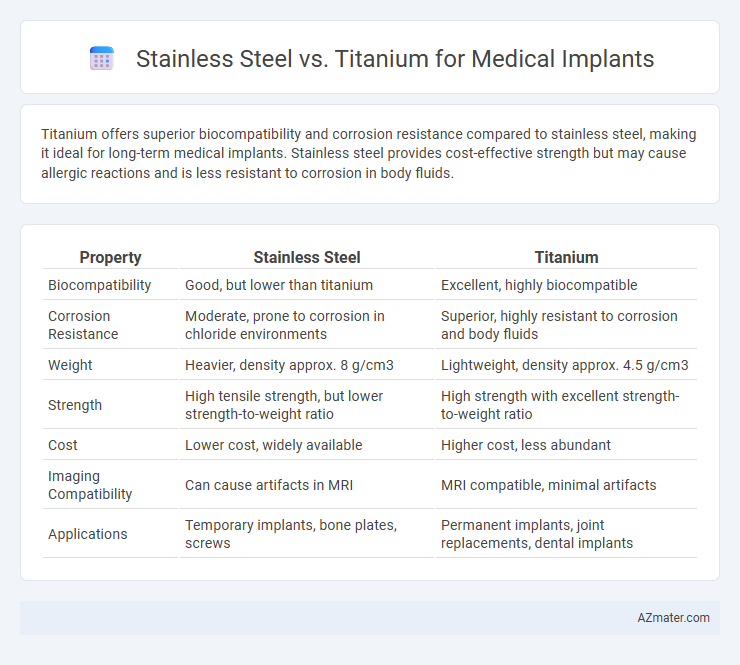Titanium offers superior biocompatibility and corrosion resistance compared to stainless steel, making it ideal for long-term medical implants. Stainless steel provides cost-effective strength but may cause allergic reactions and is less resistant to corrosion in body fluids.
Table of Comparison
| Property | Stainless Steel | Titanium |
|---|---|---|
| Biocompatibility | Good, but lower than titanium | Excellent, highly biocompatible |
| Corrosion Resistance | Moderate, prone to corrosion in chloride environments | Superior, highly resistant to corrosion and body fluids |
| Weight | Heavier, density approx. 8 g/cm3 | Lightweight, density approx. 4.5 g/cm3 |
| Strength | High tensile strength, but lower strength-to-weight ratio | High strength with excellent strength-to-weight ratio |
| Cost | Lower cost, widely available | Higher cost, less abundant |
| Imaging Compatibility | Can cause artifacts in MRI | MRI compatible, minimal artifacts |
| Applications | Temporary implants, bone plates, screws | Permanent implants, joint replacements, dental implants |
Introduction to Medical Implant Materials
Stainless steel and titanium are two primary materials used in medical implants due to their biocompatibility and mechanical properties. Stainless steel, typically 316L grade, offers cost-effectiveness and strength but may pose higher risks of corrosion and allergic reactions compared to titanium. Titanium exhibits superior corrosion resistance, excellent osseointegration, and a lower density, making it ideal for long-term implants requiring high biocompatibility and durability.
Overview of Stainless Steel in Medical Implants
Stainless steel, primarily 316L grade, is widely used in medical implants due to its excellent corrosion resistance, biocompatibility, and mechanical strength. It exhibits favorable properties such as good wear resistance and ease of fabrication, making it suitable for orthopedic implants, surgical instruments, and temporary fixation devices. Despite being less lightweight than titanium, stainless steel remains a cost-effective and reliable option for a broad range of medical applications.
Titanium Alloys in Medical Applications
Titanium alloys offer superior biocompatibility, corrosion resistance, and strength-to-weight ratio compared to stainless steel, making them ideal for medical implants such as joint replacements and dental prosthetics. Their ability to osseointegrate with bone tissue reduces implant rejection and promotes faster healing. These properties ensure titanium alloys remain the preferred choice for long-term, durable medical implants.
Mechanical Properties: Strength and Flexibility
Stainless steel offers high tensile strength and excellent fatigue resistance, making it suitable for load-bearing medical implants, but its rigidity can limit flexibility. Titanium combines high strength with superior elasticity, providing better adaptability to bodily movements and reducing stress shielding. The elastic modulus of titanium closely matches that of human bone, enhancing implant longevity and patient comfort compared to the stiffer stainless steel.
Corrosion Resistance and Biocompatibility
Titanium exhibits superior corrosion resistance compared to stainless steel due to its ability to form a stable, protective oxide layer that prevents ion release in the body, enhancing implant longevity. The biocompatibility of titanium is higher as it elicits minimal immune response and integrates better with bone tissue, reducing inflammation and promoting osseointegration. Stainless steel, while cost-effective and mechanically strong, is more prone to corrosion and potential metal ion leaching, which can cause adverse biological reactions in sensitive patients.
Weight Comparison: Stainless Steel vs Titanium
Titanium is considerably lighter than stainless steel, with a density approximately 60% that of stainless steel, making it ideal for medical implants where minimizing weight is crucial. This weight advantage reduces patient discomfort and enhances mobility, especially in orthopedic and dental implants. Despite its lighter weight, titanium maintains excellent strength and biocompatibility, outperforming stainless steel in long-term medical applications.
Longevity and Durability of Implants
Titanium offers superior longevity and durability for medical implants due to its excellent corrosion resistance and biocompatibility, reducing the risk of implant failure over time. Stainless steel, while strong and cost-effective, is more prone to corrosion and metal ion release, potentially diminishing implant lifespan and biocompatibility. The enhanced mechanical strength and inert properties of titanium make it the preferred material for long-term medical implants such as joint replacements and dental implants.
Allergic Reactions and Patient Safety
Stainless steel and titanium are commonly used materials for medical implants, with titanium showing superior biocompatibility and significantly lower rates of allergic reactions due to its non-reactive oxide layer. Stainless steel, often containing nickel and chromium, poses a higher risk of hypersensitivity and allergic responses, potentially leading to implant rejection or inflammation. Patient safety is enhanced with titanium implants, as they reduce the incidence of adverse immune responses and promote better osseointegration.
Cost and Availability Factors
Stainless steel remains more cost-effective and widely available than titanium for medical implants, making it a preferred choice in budget-sensitive healthcare settings. Titanium offers superior biocompatibility and corrosion resistance but comes with higher material and manufacturing costs, limiting its accessibility in some regions. The global supply chain for stainless steel is well-established, ensuring consistent availability compared to the more specialized and expensive sourcing of titanium.
Choosing the Right Material for Medical Implants
Stainless steel offers cost-effective strength and corrosion resistance, making it a common choice for temporary medical implants, while titanium provides superior biocompatibility, corrosion resistance, and lower density ideal for long-term implants. Titanium's ability to osseointegrate with bone minimizes rejection and promotes healing, which is critical for permanent implants such as joint replacements and dental fixtures. Selecting the right material depends on factors like implant duration, mechanical demands, patient sensitivity, and specific clinical applications to optimize patient outcomes.

Infographic: Stainless steel vs Titanium for Medical implant
 azmater.com
azmater.com